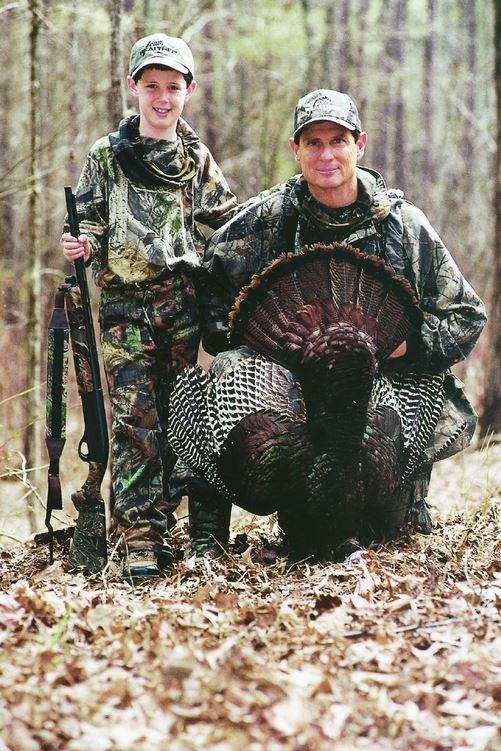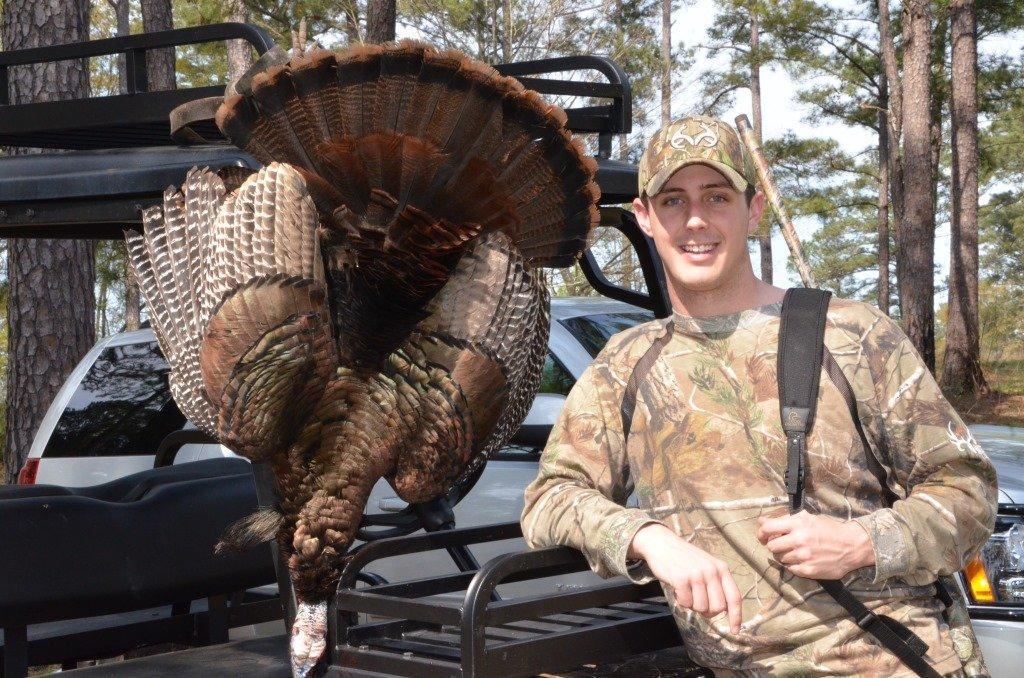Check Out These Turkey Hunting Tips
Born in 1992, Tyler Jordan killed his first turkey at age eight. It's one of his favorite memories.
He and his father Bill Jordan, Realtree founder, shared the moment. They'd gone out on a Thursday afternoon to roost turkeys for their Friday morning hunt. Two birds not far from a big food plot responded.
After convincing my mom and teacher to let me go hunt, we rose early the next morning and set up a hen decoy 15 yards from us, sat on the ground, and called," Jordan recalled. "One gobbled immediately. And it wasn't long before he hit the ground and came running to us. I shot him at 20 yards while he was strutting around the decoy.
First birds are special to all turkey hunters.
Needless to say, you would not have found a happier 8-year-old boy or prouder dad that morning. And Mom was happy because I arrived at school before 10 a.m. I was hooked after that first one and have been hunting on our farms in Georgia and Alabama since then.
Tyler is currently attending Ole Miss, his dad's alma mater. Here are 10 of his top turkey hunting tips.
1: Scouting for Opening Day - and After
Instead of walking in the woods blind on opening day, Tyler Jordan will go where he plans to hunt, a day or two in advance.
I'll use a barred owl or crow call to find where birds are roosting. Opening weekend is a great time to kill a turkey because they will sometimes gobble to almost anything, he said. I try to use non-turkey locator calls before the season so the birds don't get used to hearing my turkey calling. Eastern turkeys, the subspecies found where I usually hunt, get more leery when they hear the same turkey call over and over. If you play your cards right though, opening weekend could be the most successful out of the entire season.
What about trail cameras?
Later on, when hunting gets tougher, we'll set up trail cameras to see if turkeys are passing by a particular area, he explained. Let's face it, it's much easier to call a turkey in when you're already sitting where he wants to go.
2: Open Field Gobbler Tactics
Field turkeys are the most frustrating to hunt because you can see and hear them. But for whatever reason, they just won't come the extra distance, which requires more work on your end, Jordan said.
In his opinion, these can sometimes be the most exciting hunts. And he advised not to lose hope. Fanning - using a turkey fan or a decoy to move on a bird - is one of his favorite tactics. He stressed safety first and suggested reading turkey body language. He's killed many turkeys with this trending strategy.
There's something about seeing that fan come closer that just gets turkeys fired up, he said. I learned this tip from my dad when I was 13. It was a hot afternoon, and the gobbler, underneath some shade on the edge of a big food plot, was strutting with two hens and had stopped responding to any of my calls. I snuck up the hill with my fan in front of my face and would occasionally look around to make sure he was looking at it. Sure enough, he came out of strut and stared at the fan for 15-20 seconds before he made a break in my direction. I quickly backed up and got behind a tree before he reached the crest of the hill. He came right in at about 20 yards before I took the shot.
3: Henned-Up Turkeys

You must have patience. In this situation, stop calling the gobbler, and try calling the hen. If you can get her fired up and cutting back at you, then there's a good chance she will bring the gobbler right in with her. They don't like other hens talking to their boyfriends. That's when you must depend on your patience and calling ability to coax in the boss hen. What will make her more upset is if you start copying exactly what she's saying in a louder and more aggressive way, he said.
On a Florida hunt two years ago, Jordan got a hen fired up and calling back. He never even heard the gobbler until he saw the turkey following her down the road, right to him.
4: Bad Weather Hunting
All hunters deal with tough weather conditions. Jordan believes you should tough it out.
It's easy to give up on a turkey hunt when there's wind and rain. But hunting in bad weather can sometimes be good . . . if you adjust your tactics. Thunder can sometimes cause turkeys to shock gobble. And overcast activities will sometimes prolong gobbling throughout the day.
As Jordan pointed out, turkeys will also stay on the roost longer when it's raining. They prefer open areas where predators are less likely to sneak up on them. His hunting advice: You can try to stalk up on an open field where the vegetation is low or areas where there is less cover. The key here, though, is to be patient and to call very little, if at all. Try to determine where the birds are headed, and see if you can beat them there.
Worst of all could be the wind. There's nothing I hate more than hunting in the wind," Jordan said. "You can't hear the turkeys, and you aren't really sure if they can hear you. Another disadvantage of the wind is judging the distance of a gobbler if you can hear him. Try to get in thick timber where the wind isn't as bad, and move from one spot to the next. Be loud using a box or a mouth call. And make sure your gun is up and ready because you probably won't hear him coming.
5: Hung-Up Gobblers
We've all been there. The gobbler answers but holds his ground. Tyler Jordan's first course of action: move out and reposition. He's probably heard you call from the same spot and direction, and he's just no longer interested. If the cover is thick enough, back out of the area and try calling from a different spot, Jordan said.
Sometimes I'll even try a different call to change things up. If that doesn't work, and you have nothing to lose, maybe try to close the distance. It's a risky tactic, but I've had it work under the right circumstances. There must be enough cover or something to block his view. You'll probably fail more than you succeed doing this, but it may be all you can do.
His final thought on hung-up gobblers? Turkeys have their own schedules; all you might need is a little patience.
6: Turkey Calls and Gear
What gear does Tyler Jordan carry?
My number-1 essential is toilet paper because you never know when Mother Nature will come knocking. Another must-carry for me is an extra facemask and set of gloves. More than once, I've lost one or the other, and it cost me a turkey. Turkeys have unbelievable eyesight, and everything you can do to conceal is a plus.
Here's his Top 10 gear list:
- Toilet paper
- Extra set of gloves and facemask
- Bottled water
- LED flashlight for early-morning hunts
- Clippers
- Box call
- Slate call
- Crow call
- Owl call
- Binoculars
7: Mouth-Calling Tips
Mouth diaphragms can be tough for some to use.
Being able to run a mouth call can be a challenge if you've never done it before, he said. My only tip would be to just play around with it until you figure out a particular call brand or cut that suits you. It took me about two years until I got comfortable enough to call turkeys using one.
His favorite cut is a triple reed. For me, it's easier to blow and to control pitches.
8: Turkey Hunting from Blinds
Upside: If you have a small kid that can't sit still long, or if it's raining, blinds can be extremely effective. They also are great for hunting open fields where there are no trees and for bowhunting; with the eyesight turkeys have, it can be very hard to draw back on a bird while out in the open.
Downside: I personally don't like ground blinds because they limit mobility, he said.
9: Setting Up Turkey Decoys
You can't just stake decoys and expect them to work. You have to make choices.
With strutter decoys, use a jake fan so it doesn't scare the dominant tom and so it attracts gobblers of all ages, Jordan said. Depending on the time of year, the stake can be removed to resemble a gobbler and hen breeding, which will also coax a tom in. Also, any time you can add real feathers will make a huge difference.
10: Mentoring Younger Hunters
My dad took me at an early age to observe and learn the skills of turkey hunting. I was able to experience the excitement of calling in turkeys, hearing the gobbles, and witnessing the unbelievable sight of having them in full strut right in front of me. I got to spend time with him and see how it was done, Jordan said.
Allow a child to go along and experience the excitement firsthand. One thing my dad has done with all three of us is never pressure us into going. This has made all the difference in my mind. He exposed us to the outdoors and to turkey hunting. But he let us choose if it was for us or not. That's what I would try to do with today's young hunters.
[Editor's note: This article was first published on April 2, 2015. © Realtree photos]
Go here for more Realtree turkey hunting. Follow us on Facebook.








